PRINCETON, NJ -- Americans start the new year with a variety of national concerns on their minds. Although none is dominant, the government, at 21%, leads the list of what Americans consider the most important problem facing the country. The economy closely follows at 18%, and then unemployment/jobs and healthcare, each at 16%. No other issue is mentioned by as much as 10% of the public; however, the federal budget deficit or debt comes close, at 8%.
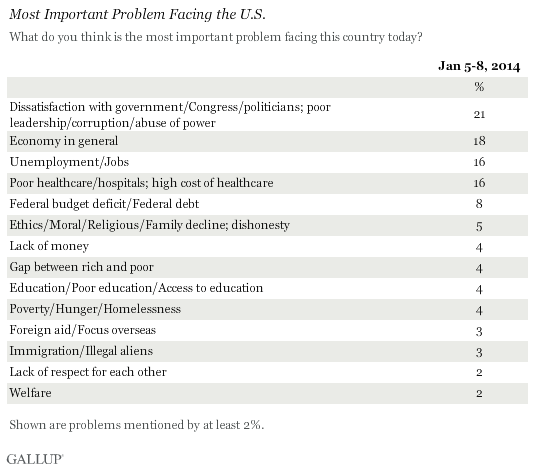
Americans' current telling of the top problems facing the country comes from a Jan. 5-8 Gallup poll. The rank order is similar to what Gallup found in December, although the percentage mentioning unemployment has risen four percentage points to 16%.
Mentions of the government as the top problem remain higher than they were prior to the partial government shutdown in October. During the shutdown, the percentage naming the government as the top problem doubled to 33% from 16% in September.
Compared with a year ago, mentions of government are up slightly. Mentions of healthcare, on the other hand, have quadrupled -- from 4% in January 2013 to 16% today, likely related to highly visible problems with the rollout of the 2010 healthcare law. At the same time, references to the federal deficit or debt have declined from 20% to 8%, while mentions of the economy in general have dipped from 21% to 18%, and mentions of unemployment/jobs are the same, at 16%.
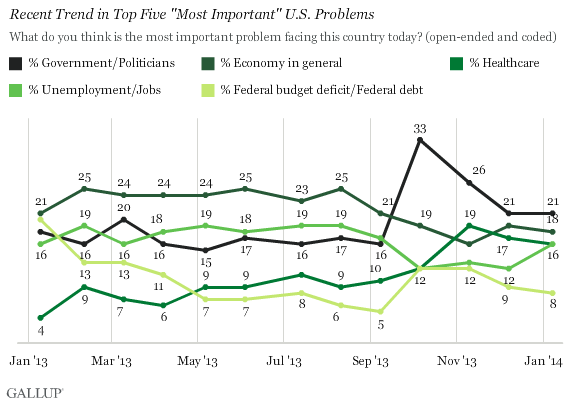
The noteworthy increase in healthcare mentions over the past year stems from increases among all party groups, but particularly Republicans, among whom concern rose from 4% to 24%. Concern about healthcare as the top problem was up half as much among independents (+10 points) and Democrats (+9 points).
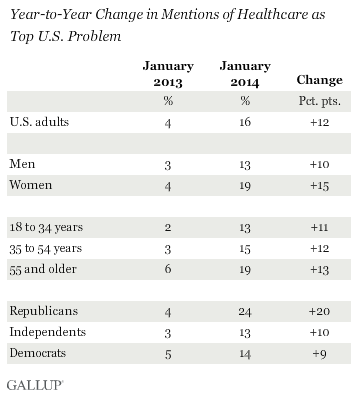
Concern about the federal budget deficit peaked last January after the deficit figured prominently in the "fiscal cliff" budget negotiations, but has since declined. This has occurred across the political spectrum, but more sharply with Americans aged 55 and older than among younger adults.
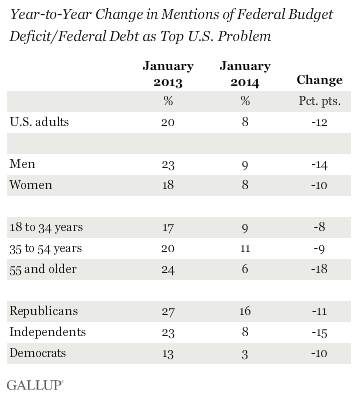
Healthcare and Federal Budget Deficit Are Outsized Problems Among GOP
Government is the No. 1 concern among all three party groups, although Republicans and independents are more likely than Democrats to cite it. Mentions of healthcare as a problem are much higher for Republicans than for independents and Democrats.
The federal budget deficit also troubles Republicans more than the other groups, while unemployment sparks more concern with independents and Democrats than with Republicans. The economy in general ranks high among all three party groups, with roughly equal percentages naming it.
Four other issues are mentioned by at least 5% of any party group, and of these, the "gap between rich and poor" shows the most disparity. This issue that President Barack Obama has focused on is cited by 6% of Democrats and 5% of independents, but only 1% of Republicans.
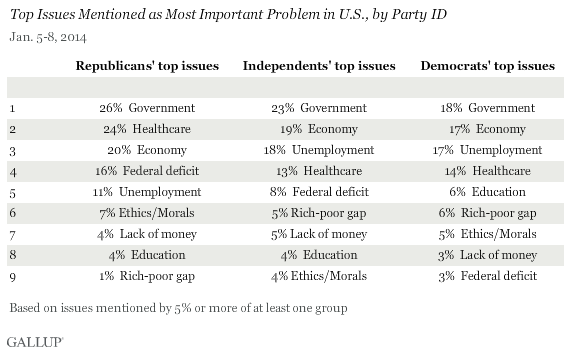
Bottom Line
The issues that concern Americans at the start of 2014, and as Obama prepares to deliver the second State of the Union address of his second term, are similar to those Gallup measured in December, and not wildly different from those last January. While the top five issues today also figured prominently in January 2013, their relative positioning has shifted in ways that could affect how Obama frames his message. Concern about unemployment, while up slightly from December, is the same as it was a year ago, and both the economy and problems with government remain top issues. At the same time, concern about healthcare is up, likely resulting from issues with the rollout of the Affordable Care Act, while concern about the federal deficit has dwindled.
Survey Methods
Results for this Gallup poll are based on telephone interviews conducted Jan. 5-8, 2014, with a random sample of 1,018 adults, aged 18 and older, living in all 50 U.S. states and the District of Columbia.
For results based on the total sample of national adults, the margin of sampling error is ±4 percentage points at the 95% confidence level.
Interviews are conducted with respondents on landline telephones and cellular phones, with interviews conducted in Spanish for respondents who are primarily Spanish-speaking. Each sample of national adults includes a minimum quota of 50% cellphone respondents and 50% landline respondents, with additional minimum quotas by region. Landline and cell telephone numbers are selected using random-digit-dial methods. Landline respondents are chosen at random within each household on the basis of which member had the most recent birthday.
Samples are weighted to correct for unequal selection probability, nonresponse, and double coverage of landline and cell users in the two sampling frames. They are also weighted to match the national demographics of gender, age, race, Hispanic ethnicity, education, region, population density, and phone status (cellphone only/landline only/both, and cellphone mostly). Demographic weighting targets are based on the most recent Current Population Survey figures for the aged 18 and older U.S. population. Phone status targets are based on the most recent National Health Interview Survey. Population density targets are based on the most recent U.S. census. All reported margins of sampling error include the computed design effects for weighting.
In addition to sampling error, question wording and practical difficulties in conducting surveys can introduce error or bias into the findings of public opinion polls.
View methodology, full question results, and trend data.
For more details on Gallup's polling methodology, visit www.gallup.com.
